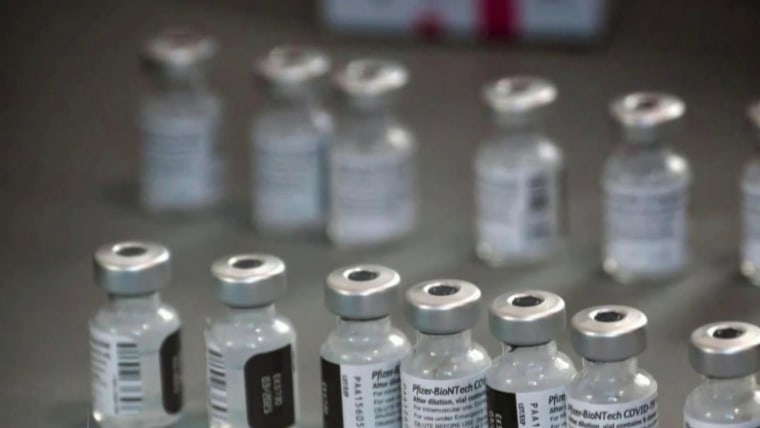Despite the 95 percent effectiveness at preventing coronavirus infection after two doses of its vaccine, Pfizer is now seeing what a third dose might do.
The company announced Thursday that a booster dose is being studied among people who received their first doses of the vaccine more than six months ago.
Full coverage of the coronavirus outbreak
In an interview with NBC News' Lester Holt, Pfizer CEO Albert Bourla said the hope is that a third dose will boost the immune response even higher, offering better protection against variants.
"We believe that the third dose," Bourla said, "will raise the antibody response 10- to 20- fold."
The new study will monitor the safety and efficacy of a third dose in two age groups: those 18 to 55 and those 65 to 85. The participants come from a group of people who were among the first to receive the Pfizer-BioNTech vaccine: people who volunteered for Pfizer's initial Phase 1/2 clinical trial, which began in May.
During that trial, participants received two doses of the vaccine three weeks apart. The same dose interval is what's currently recommended.
The third shot will be exactly the same as what participants got a year ago.
Pfizer also plans to begin testing whether a modified version of the vaccine works well against the variant from South Africa.
Indeed, as SARS-CoV-2 changes, the vaccines may have to be tweaked. The Food and Drug Administration issued guidance Monday saying vaccine manufacturers may be able to ease away from lengthy clinical trials to prove safety and effectiveness for vaccines that have been tweaked to account for variants.
That's not unlike how the flu shot changes from year to year, accounting for the strains most likely to infect people.
"Every year, you need to go to get your flu vaccine," Bourla said. "It's going to be the same with Covid. In a year, you will have to go and get your annual shot for Covid to be protected."
That suggests that even when the pandemic ends, Covid-19 may be here to stay. Ongoing studies of re-engineered vaccines are necessary to understand when boosters may be needed, outside experts said.
"You need to cast a wide net to find Goldilocks," said John Grabenstein, a former executive director of medical affairs for vaccines at Merck and a former Defense Department immunologist. "You want to look at shorter intervals, you want to look at longer intervals, to determine when is the best time, if needed, to re-vaccinate."
Download the NBC News app for full coverage of the coronavirus outbreak
So far, evidence suggests that the existing Pfizer-BioNTech vaccine remains effective against variants first identified in the U.K., Brazil and South Africa.
Bourla said the company's goal if and when another variant emerges is to pivot and tweak the current vaccine within 100 days.
Moderna, which makes a similar Covid-19 vaccine, announced Wednesday that it had also started studying the effects of adding a third dose to its regimen and has developed a version of the vaccine designed to target the variant from South Africa.
https://ift.tt/2PceJeA
Health

No comments:
Post a Comment